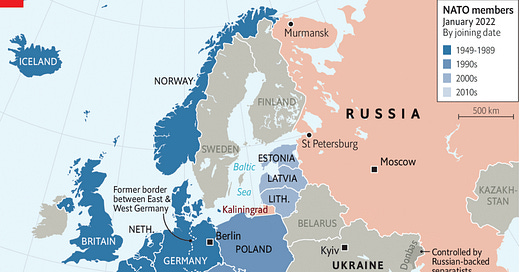A Few Thoughts About NATO and Russia
W.J. Astore
NATO, the North Atlantic Treaty Organization, dates from 1949. From its very name, the alliance focused on North Atlantic countries and Western Europe, and stated its intent was to deter the Soviet Union from attacking European countries like Germany, France, and Italy.
Interestingly, Dwight D. Eisenhower was NATO's first SACEUR, or Supreme Allied Commander in Europe, and he favored the complete withdrawal of U.S. troops when Europeans were back on their feet from World War II and capable of defending themselves. Since U.S. troops are still stationed in Europe nearly 75 years after the founding of NATO, one must assume Europe is still not ready.
All kidding aside, getting the U.S. to commit troops to NATO was in part a European ploy against a repeat of American isolationism, which had manifested itself in the aftermath of World War I. There was indeed a time when Americans wanted nothing to do with European intrigue and folly, and in the 1930s the U.S. Senate even attacked European arms manufacturers as warmongering "merchants of death." Imagine that!
Nowadays, of course, it's the USA that dominates the world's arms market, and our merchants of death truly dominate the world. Our weapons merchants now deliver weapons to places like Ukraine in the name of "freedom" and "protecting democracy," though I have yet to see a freedom or democracy bomb. (Interestingly, the names we choose for weapons systems are far more honest, like Hellfire missiles and Predator and Reaper drones. Talk about peddling death!)
When the Soviet Union collapsed in 1991, NATO's reason for being collapsed along with it, but reason not the need, as King Lear said. NATO was not about to disband itself; lucrative and powerful bureaucracies rarely do. So NATO's mission began to change to "out of area" operations, working in concert with the UN in places like Bosnia and Kosovo. Speaking of "out of area," NATO countries also got involved in the War on Terror, including U.S. folly in Afghanistan, which provided political cover for the U.S. in the sense that American officials could claim to be working as part of a coalition to help the Afghan people.
But the biggest money maker of all for NATO and for today's merchants of death has been expansion. Recall that the Soviet Union collapsed in 1991. Recall that NATO was created to deter a Soviet attack on Western Europe. If NATO was going to continue to exist, it needed to morph into something else, but most of all it needed to grow. And so it did.
In 1999, former Warsaw Pact countries like Poland, Hungary, and the Czech Republic joined. Five years later, Bulgaria, Romania, Slovakia, Slovenia, and the three Baltic States (Latvia, Lithuania, and Estonia) joined as well. In short, what began as a defensive alliance focused on Western Europe has grown into an alliance that includes just about all of Eastern Europe. And the new NATO members have been eager customers for NATO-compatible weaponry, much of it made in the USA.

If I were Russian, I think I'd look at the dramatic eastern expansion of NATO as worrisome. If not aggressive, it is most certainly constrictive. And with former Soviet republics like Georgia and Ukraine mentioned as future NATO members, this constriction would seem more like strangulation if I occupied the Kremlin. And I'm not an ex-KGB agent like Vladimir Putin.
I remember a military history symposium in 1998 I attended in which the future of NATO was bandied about. Russian concerns about NATO expansion were discussed by four senior generals. One of them, General Sir Anthony Farrar-Hockley, basically argued that NATO should tell the Russians to go pound sand. In the notes I took from the discussion, Farrar-Hockley said that to forego NATO expansion because of Russian concerns would be to grant Russia a continuing fiefdom in Eastern Europe. Besides, Russia had nothing to fear from an expanded NATO, he added. The three other generals expressed some concern that Russia could see expansion as encirclement, and given Russia's history of being invaded and devastated by countries to its west, any expansion would have to be done carefully, with plenty of dialogue.
We're not witnessing much dialogue, are we? Instead, NATO expansion is seen by the U.S. as uncontroversial, and indeed as desirable, and certainly as non-threatening. Surely the Russians have nothing to fear from such a vast alliance creeping up to its very door step! It's not like Russia wasn't devastated by Napoleon in 1812, or by Germany and its various allies in World Wars I and II. I'm sure that will never happen again. Right, comrade?
Here's an idea. Perhaps NATO expansion would be less problematic for the Russians if the U.S. withdrew all its troops from Europe, harkening back to Eisenhower's initial vision. Shouldn't European countries be able to defend themselves after almost 75 years of U.S. aid? Maybe Donald Trump wasn't so crazy after all in asking whether NATO was really worth the candle.




